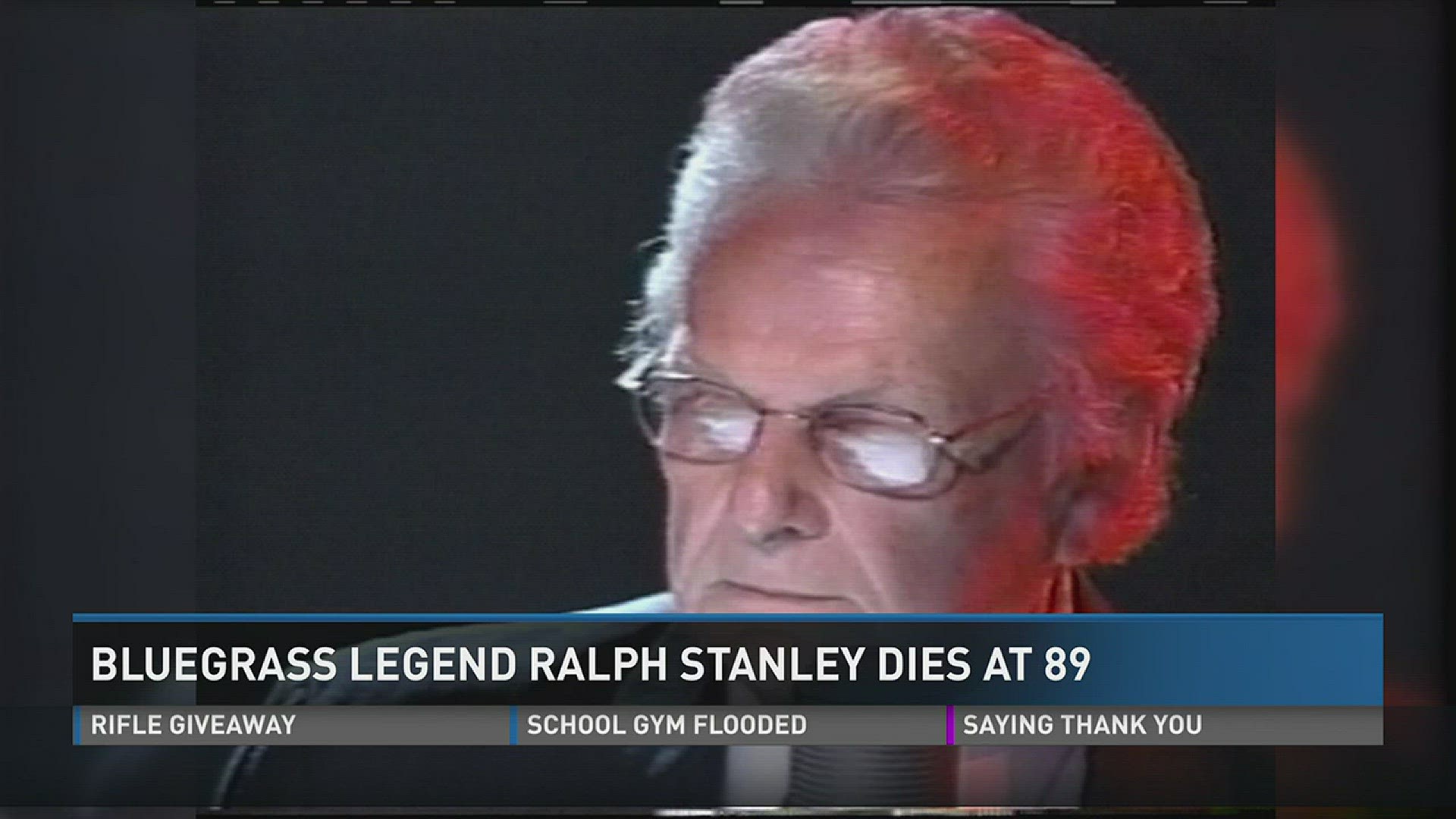The family of bluegrass legend Dr. Ralph Stanley will lay him to rest next week.
The service will held for family and friends of Dr. Stanley at the Hills of Home Park in McClure, Virginia at 5:00 p.m. on Tuesday, June 28. A Masonic service will begin an hour later, and the funeral will follow with a VFW graveside service and entombment.
The family is asking people to send donations to the Shriners Hospitals for Children or St. Jude's instead of flowers.
ORIGINAL STORY:
Bluegrass legend Dr. Ralph Stanley died Thursday night after a battle with skin cancer, according to aFacebook post by his grandson, Nathan Stanley.
Dr. Stanley was 89 years old and a member of the Grand Ole Opry and the Bluegrass Hall of Fame. After receiving an honorary Doctorate of Music from Lincoln Memorial University in 1976 (and another from Yale in 2014), he was known to fans worldwide as "Doctor Ralph."
Singing was as natural as breathing for Ralph Edmund Stanley, who was born Feb. 25, 1927, on Big Spraddle Creek in Dickenson County, Virginia. His first public performance was in church, and when he was 11 years old, his mother said he could either have a pig or a banjo. Luckily for music fans everywhere, he chose the latter. His style of banjo picking — which, like the man himself, had no frills — would go on to influence countless musicians.
"You don't replace a Ralph Stanley," said Eric Gibson of bluegrass duo The Gibson Brothers. "His voice sounds like it has been here since time began."
"He sang mountain music, and he took what he did very seriously," said singer-songwriter Paul Burch, who recorded with Dr. Stanley and opened for him on a UK tour. "I think he wanted other people to hear the beauty of the region that he came from."
In 1946, Dr. Stanley, just out of the Army, and his older brother Carter began performing. The Stanley Brothers had a daily, 15-minute time slot on the radio station WNVA. The show was sponsored by Clinch Valley Insurance Company, which inspired the name of the Stanleys' band: The Clinch Mountain Boys. They soon moved to WCYB in Bristol, Virginia, and became a beloved part of "The Farm and Fun Time Show."
The Stanleys recorded their first songs for Rich-R-Tone Records in 1947. Their renditions of songs like "Pretty Polly" and "Little Glass of Wine" caught the attention of Columbia Records' Art Satherly, who signed them in 1948, much to the dismay of the father of bluegrass, Bill Monroe, who left the label after the Stanleys joined. (Monroe and the Stanleys later reconciled.)
The mid-1950s were tough times for the Stanley Brothers. At one point, they took a break from music, moved to Michigan and found work at the Ford plant in Dearborn. But soon Mercury Records came calling, and by August 1953, Carter and Ralph Stanley were Nashville-bound.
The recordings the Stanley Brothers made for Mercury are considered by many to be their best work, and several of their songs, including "I'm Lonesome Without You" and "Memories of Mother," are bluegrass classics that can be heard at festivals and jam sessions nationwide.
When their contract with Mercury expired, the Stanley Brothers went to King Records in Cincinnati, a label that boasted artists from James Brown to Cowboy Copas.
After Carter died in December 1966, his grief-stricken brother made the difficult decision to continue performing with The Clinch Mountain Boys as a solo artist. "I pulled myself up, and I made up my mind that music was all I could do, all I ever was meant to do, and I was going to do it," he said the 2009 autobiography he wrote with Eddie Dean, "Man of Constant Sorrow: My Life and Times."
Several Clinch Mountain Boys who played with Dr. Stanley went on to have successful solo careers, including Keith Whitley, Ricky Skaggs and Larry Sparks.
Dr. Stanley's career was rejuvenated in 2000 when his music was featured on the multiplatinum soundtrack of the film "O Brother, Where Art Thou?" His eerie, captivating recording of "O Death" won a Grammy for Best Male Country Vocal Performance, and it introduced him to a new generation of fans. He won a second Grammy for "Lost in the Lonesome Pines," a bluegrass album he recorded with Jim Lauderdale.
Lauderdale and Buddy Miller produced Dr. Stanley's final album, "Ralph Stanley and Friends: Man of Constant Sorrow." The album, which was released in 2015, featured Dr. Stanley collaborating with artists ranging from bluegrass icon Del McCoury to country star Dierks Bentley to Americana duo Gillian Welch and David Rawlings.
"It was pretty overwhelming," said Miller of the recording process. "There was no one that wasn't in awe of his voice. He's a soul singer. He got more out of one syllable than most of us get in a lifetime."
In 2000, he was named a Library of Congress Living Legend. He received the National Medal of the Arts in 2006, and in 2014 was named a fellow of the American Academy of Arts and Sciences. The Stanley Brothers' "Rank Stranger" is part the Library of Congress' National Recording Registry, a list of recordings that are culturally and historically important.
In his autobiography, Stanley wrote that when he celebrated his 50th anniversary in the music business, Bob Dylan sent him a telegram. Its final line: "You will live forever."
Stanley is survived by his wife of nearly 48 years, Jimmi Stanley; his children, Lisa Stanley Marshall, Tonya Armes Stanley and Ralph Stanley II; grandchildren Nathan Stanley, Amber Meade Stanley, Evan Stout, Ashley Marshall, Alexis Marshall, Taylor Stanley and Ralph Stanley III; and great-grandchild Mckenzie Stanley
Funeral arrangements are unknown at this time.

